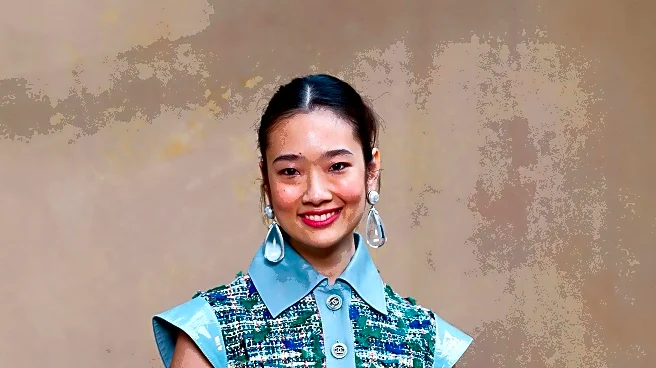What is the story about?
What's Happening?
Pauline Dujancourt, a French-born, London-based designer, presented her Spring 2026 Ready-to-Wear collection at Fashion Week. This marks only her second runway show, yet she has already established a distinct aesthetic. Dujancourt's collection is deeply personal, drawing inspiration from her family history and her experiences during the pandemic. The show featured a narrative arc, beginning with garments inspired by her mother's wedding dress and traditional mourning attire, and evolving into vibrant blues. The collection also paid homage to a friend who passed away, with crochet birds given to attendees as a tribute. Dujancourt's designs are known for their intricate knitwear, blending traditional techniques with modern storytelling.
Why It's Important?
Dujancourt's work highlights the evolving landscape of fashion, where personal storytelling and emotional depth are becoming increasingly valued. Her ability to transform knitwear into ethereal garments challenges traditional perceptions of the medium, potentially influencing future fashion trends. The collection's emotional resonance and technical complexity demonstrate the potential for fashion to serve as a medium for personal expression and cultural commentary. This approach may inspire other designers to explore similar themes, impacting the broader fashion industry by encouraging more narrative-driven collections.
What's Next?
As Dujancourt continues to develop her brand, her unique approach to knitwear and storytelling is likely to attract further attention from the fashion industry. Her success may lead to collaborations with other designers or brands seeking to incorporate her distinctive style. Additionally, her focus on emotional depth and personal narratives could inspire a shift in fashion marketing strategies, emphasizing authenticity and connection with consumers. The industry's response to her work will be crucial in determining the future direction of fashion design and presentation.
Beyond the Headlines
Dujancourt's collection raises questions about the role of fashion in processing grief and personal experiences. By integrating elements of her personal life into her designs, she challenges the notion of fashion as purely aesthetic, suggesting it can also be therapeutic and reflective. This perspective may encourage discussions about the emotional and psychological impact of fashion, both for designers and consumers. As the industry continues to evolve, the integration of personal narratives could lead to more inclusive and diverse representations in fashion.















